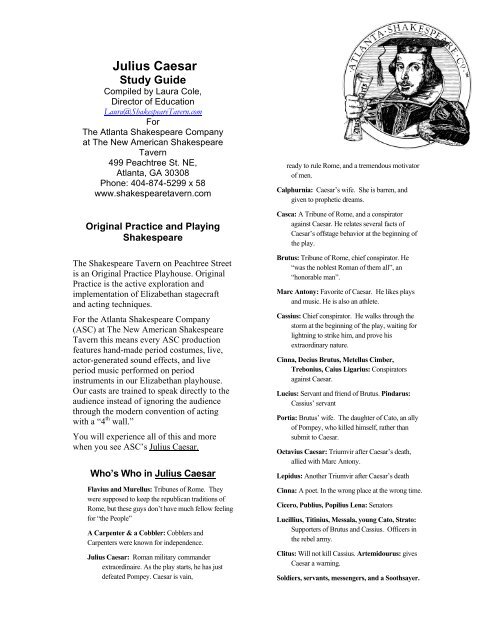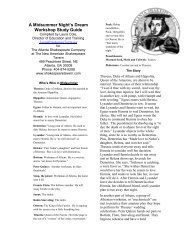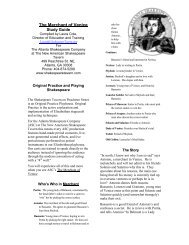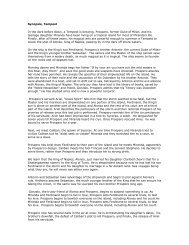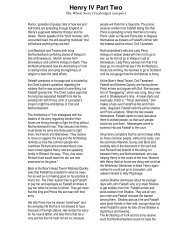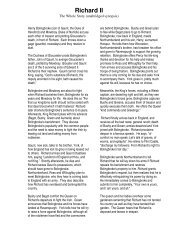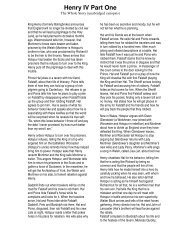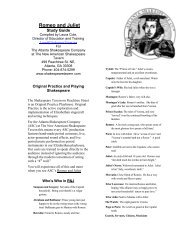Julius Caesar Study Guide - The New American Shakespeare Tavern
Julius Caesar Study Guide - The New American Shakespeare Tavern
Julius Caesar Study Guide - The New American Shakespeare Tavern
You also want an ePaper? Increase the reach of your titles
YUMPU automatically turns print PDFs into web optimized ePapers that Google loves.
<strong>Julius</strong> <strong>Caesar</strong><br />
<strong>Study</strong> <strong>Guide</strong><br />
Compiled by Laura Cole,<br />
Director of Education<br />
Laura@<strong>Shakespeare</strong><strong>Tavern</strong>.com<br />
For<br />
<strong>The</strong> Atlanta <strong>Shakespeare</strong> Company<br />
at <strong>The</strong> <strong>New</strong> <strong>American</strong> <strong>Shakespeare</strong><br />
<strong>Tavern</strong><br />
499 Peachtree St. NE,<br />
Atlanta, GA 30308<br />
Phone: 404-874-5299 x 58<br />
www.shakespearetavern.com<br />
Original Practice and Playing<br />
<strong>Shakespeare</strong><br />
<strong>The</strong> <strong>Shakespeare</strong> <strong>Tavern</strong> on Peachtree Street<br />
is an Original Practice Playhouse. Original<br />
Practice is the active exploration and<br />
implementation of Elizabethan stagecraft<br />
and acting techniques.<br />
For the Atlanta <strong>Shakespeare</strong> Company<br />
(ASC) at <strong>The</strong> <strong>New</strong> <strong>American</strong> <strong>Shakespeare</strong><br />
<strong>Tavern</strong> this means every ASC production<br />
features hand-made period costumes, live,<br />
actor-generated sound effects, and live<br />
period music performed on period<br />
instruments in our Elizabethan playhouse.<br />
Our casts are trained to speak directly to the<br />
audience instead of ignoring the audience<br />
through the modern convention of acting<br />
with a “4 th wall.”<br />
You will experience all of this and more<br />
when you see ASC’s <strong>Julius</strong> <strong>Caesar</strong>.<br />
Who’s Who in <strong>Julius</strong> <strong>Caesar</strong><br />
Flavius and Murellus: Tribunes of Rome. <strong>The</strong>y<br />
were supposed to keep the republican traditions of<br />
Rome, but these guys don’t have much fellow feeling<br />
for “the People”<br />
A Carpenter & a Cobbler: Cobblers and<br />
Carpenters were known for independence.<br />
<strong>Julius</strong> <strong>Caesar</strong>: Roman military commander<br />
extraordinaire. As the play starts, he has just<br />
defeated Pompey. <strong>Caesar</strong> is vain,<br />
ready to rule Rome, and a tremendous motivator<br />
of men.<br />
Calphurnia: <strong>Caesar</strong>’s wife. She is barren, and<br />
given to prophetic dreams.<br />
Casca: A Tribune of Rome, and a conspirator<br />
against <strong>Caesar</strong>. He relates several facts of<br />
<strong>Caesar</strong>’s offstage behavior at the beginning of<br />
the play.<br />
Brutus: Tribune of Rome, chief conspirator. He<br />
“was the noblest Roman of them all”, an<br />
“honorable man”.<br />
Marc Antony: Favorite of <strong>Caesar</strong>. He likes plays<br />
and music. He is also an athlete.<br />
Cassius: Chief conspirator. He walks through the<br />
storm at the beginning of the play, waiting for<br />
lightning to strike him, and prove his<br />
extraordinary nature.<br />
Cinna, Decius Brutus, Metellus Cimber,<br />
Trebonius, Caius Ligarius: Conspirators<br />
against <strong>Caesar</strong>.<br />
Lucius: Servant and friend of Brutus. Pindarus:<br />
Cassius’ servant<br />
Portia: Brutus’ wife. <strong>The</strong> daughter of Cato, an ally<br />
of Pompey, who killed himself, rather than<br />
submit to <strong>Caesar</strong>.<br />
Octavius <strong>Caesar</strong>: Triumvir after <strong>Caesar</strong>’s death,<br />
allied with Marc Antony.<br />
Lepidus: Another Triumvir after <strong>Caesar</strong>’s death<br />
Cinna: A poet. In the wrong place at the wrong time.<br />
Cicero, Publius, Popilius Lena: Senators<br />
Lucillius, Titinius, Messala, young Cato, Strato:<br />
Supporters of Brutus and Cassius. Officers in<br />
the rebel army.<br />
Clitus: Will not kill Cassius. Artemidourus: gives<br />
<strong>Caesar</strong> a warning.<br />
Soldiers, servants, messengers, and a Soothsayer.
<strong>Julius</strong> <strong>Caesar</strong> <strong>Study</strong> <strong>Guide</strong> page 2<br />
<strong>The</strong> Story<br />
In ancient Rome, the general <strong>Julius</strong> <strong>Caesar</strong><br />
has just defeated the general Pompey in a<br />
bloody civil war. <strong>The</strong> people celebrate<br />
<strong>Caesar</strong>’s victory and the Tribunes scold<br />
them for their disloyalty to Pompey. <strong>The</strong><br />
people have placed crowns and other<br />
trophies on <strong>Caesar</strong>’s statue. <strong>The</strong> Tribunes<br />
decide to take them off.<br />
<strong>Caesar</strong> enters, followed by his wife<br />
Calphurnia, and several senators, including<br />
his friend, Marc Antony. <strong>The</strong>y are on their<br />
way to the celebration of Lupercal, a Roman<br />
festival. He is stopped in his path by a<br />
soothsayer, a person who can tell the future,<br />
and told “beware the Ides of March” <strong>The</strong><br />
Ides of March was the middle of the month,<br />
or March 15 th , which is just around the<br />
corner. <strong>The</strong>y continue on their way to the<br />
festivities. Brutus and Cassius remain<br />
behind.<br />
Cassius talks to Brutus about how powerful<br />
<strong>Caesar</strong> has become, and implies that he is<br />
undeserving. <strong>The</strong> conversation is<br />
punctuated several times by cheers from the<br />
nearby celebration. <strong>Caesar</strong> returns with his<br />
entourage, in a state of disorder and unease.<br />
He sees Cassius and Brutus, and speaks to<br />
Antony about his distrust of Cassius, saying<br />
“Yond Cassius has a lean and hungry<br />
look”.<br />
<strong>The</strong>y leave, continuing their conversation.<br />
Brutus and Cassius detain Casca, a senator<br />
who was with <strong>Caesar</strong>, and ask him why the<br />
crowd was shouting. Casca explains that<br />
Antony offered <strong>Caesar</strong> a crown three times,<br />
which <strong>Caesar</strong> refused each time. Casca<br />
believes <strong>Caesar</strong> really wanted it. Because of<br />
their concern that <strong>Caesar</strong> wants to be a King,<br />
the three senators plan to meet later.<br />
After Brutus and Casca leave, Cassius<br />
reveals his plan to send Brutus anonymous<br />
messages, which express the danger.<br />
<strong>Caesar</strong>’s increasing power poses to the<br />
Republic. That evening there is a terrifying,<br />
magnificent storm and Casca is thrilled at<br />
the portents of greatness. Cassius and<br />
another senator, Cinna, arrive, and the 3 of<br />
them plan to meet at Brutus’ house to<br />
convince him to join their conspiracy.<br />
Later that night (the night before the ides of<br />
March) Brutus reads the anonymous notes<br />
sent by Cassius and says, “ Th’abuse of<br />
greatness is when it disjoins remorse from<br />
power.” Cassius and the others arrive, and<br />
Brutus shakes hands with all of them,<br />
joining their conspiracy. <strong>The</strong>y discuss the<br />
possibility of killing Antony as well as<br />
<strong>Caesar</strong>, but Brutus convinces them that<br />
Antony is harmless, and that he should live.<br />
<strong>The</strong>y leave, with an agreement to show<br />
themselves “true Romans”.<br />
Brutus’ wife, Portia enters and confronts<br />
Brutus about his recent behavior. She asks<br />
him to tell her what’s troubling him. She<br />
believes a husband should confide in his<br />
wife and then wounds her own leg, to prove<br />
that she can stoically bear pain, as well as<br />
keep his secrets. He agrees to tell her later.<br />
<strong>The</strong> next morning at <strong>Caesar</strong>’s house,<br />
Calphurnia demands that <strong>Caesar</strong> stay at<br />
home. She’s had nightmares about <strong>Caesar</strong>’s<br />
murder so he agrees to stay home, and<br />
instructs Decius (a conspirator) to tell the<br />
Senate. Decius hints that <strong>Caesar</strong> would be<br />
laughed at if he chooses to stay at home<br />
because of his wife’s dreams.<br />
<strong>Caesar</strong> decides to go, calling Calphurnia’s<br />
fears foolish. When he arrives at the Capitol,<br />
several conspirators gather around him,<br />
pretending to beg him to change his mind<br />
about a decision he’s made. As the<br />
conspirators crowd around <strong>Caesar</strong>, he<br />
refuses them and insults them. Crying<br />
“Speak hands for me!” Casca stabs <strong>Caesar</strong>,<br />
the rest of the senators follow suit. Brutus,<br />
the last one, strikes as <strong>Caesar</strong> says “Et tu,<br />
Brute?” (“And you Brutus?”) Brutus tells<br />
the conspirators to bathe their hands in<br />
<strong>Caesar</strong>’s blood, and proclaim Rome’s<br />
freedom from tyranny.
<strong>Julius</strong> <strong>Caesar</strong> <strong>Study</strong> <strong>Guide</strong> page 3<br />
Antony mourns the death of <strong>Caesar</strong>, but<br />
does not confront the assassins. He asks to<br />
speak at <strong>Caesar</strong>’s funeral. Brutus agrees,<br />
over Cassius’ objections.<br />
Alone with <strong>Caesar</strong>’s body, Antony praises<br />
his friend and curses his murderers. He<br />
prophesies death, destruction and horror for<br />
Rome, and imagines that <strong>Caesar</strong>’s spirit,<br />
seeking revenge, will unleash the “dogs of<br />
war”. A servant arrives, to tell Antony that<br />
<strong>Caesar</strong>’s nephew Octavius has arrived in<br />
Rome. Out in the streets, the citizens<br />
demand an explanation for <strong>Caesar</strong>’s death.<br />
Brutus tells them that <strong>Caesar</strong> died because<br />
of his ambition, and appeals to their sense of<br />
patriotism as free Romans. <strong>The</strong> crowd<br />
cheers Brutus. Brutus asks them to stay and<br />
listen to Antony.<br />
In his speech, Antony praises <strong>Caesar</strong>, and<br />
calls Brutus and his fellow conspirators<br />
honorable men. <strong>The</strong>n he questions Brutus<br />
assessment of <strong>Caesar</strong>’s ambition. He speaks<br />
about his love for <strong>Caesar</strong>, and moves the<br />
crowd to pity. He shows the crowd <strong>Caesar</strong>’s<br />
bloody, torn cloak, and describes his death.<br />
<strong>The</strong> people demand revenge and begin to<br />
riot. As the crowd storms away, Antony<br />
says, “Now let it work. Mischief, thou art<br />
afoot”. We find out that Brutus and Cassius<br />
have been forced to flee Rome.<br />
<strong>The</strong> armies of Brutus and Cassius meet<br />
outside of Rome. Cassius and Brutus have a<br />
passionate argument, with accusations flying<br />
between them, until Cassius offers to kill<br />
himself. When they finally reconcile, Brutus<br />
tells Cassius that Portia is dead, having<br />
killed herself by swallowing fire. <strong>The</strong>y<br />
learn that Antony and Octavius, with their<br />
armies, are approaching, having put 100<br />
senators to death.<br />
<strong>The</strong> night before the battle, <strong>Caesar</strong>’s ghost<br />
appears to Brutus in his tent.<br />
<strong>The</strong> next morning, the generals meet and<br />
exchange accusations and insults.<br />
Right before the battle begins, Brutus and<br />
Cassius talk about what will happen if they<br />
lose. <strong>The</strong>y say goodbye, in case they never<br />
see each other again. <strong>The</strong> battle begins.<br />
Cassius, mistakenly believing that all is lost,<br />
orders a soldier to stab him. He dies, saying,<br />
“<strong>Caesar</strong>, thou art revenged, even with the<br />
sword that killed thee” Titinius and Brutus<br />
arrive to tell Cassius of their victory, and<br />
discover he is dead.<br />
<strong>The</strong> battle continues, and Brutus starts to<br />
lose. As the enemy approaches, the soldiers<br />
flee, urging Brutus to follow. He refuses,<br />
and convinces a soldier to hold his sword,<br />
while he runs on it, killing himself.<br />
Octavius and Antony arrive and see Brutus’<br />
dead body. Antony speaks respectfully of<br />
Brutus, while Octavius takes charge and<br />
celebrates.<br />
Before a Performance, Think<br />
About This:<br />
Physical Actions Revealed:<br />
Suit the deed to the word, the word to the<br />
deed. Where are there examples of the text<br />
itself telling the reader what the physical<br />
action on stage should be? Example:<br />
“Speak hands for me!” Act 3, scene i, or<br />
“Away, slight man” Act 4, scene iii.<br />
<strong>The</strong>atergoing <strong>The</strong>n and Now:<br />
Find out what the typical Elizabethan<br />
audience was like and imagine what a<br />
performance might have been like back<br />
then. What is different about theatre going<br />
nowadays? <strong>The</strong> answers may surprise you!<br />
Clue: What would this play be like to watch<br />
outside, in the light of day?<br />
During a Performance, Watch And<br />
Listen For This:<br />
In Act 2 , sc i, Brutus says “I have not slept.<br />
Between the acting of a dreadful thing<br />
and the first motion, all the interim is<br />
like a phantasma or a hideous dream:”
<strong>Julius</strong> <strong>Caesar</strong> <strong>Study</strong> <strong>Guide</strong> page 4<br />
What is bothering Brutus? What does he<br />
think his options are, concerning the ruling<br />
of Rome, and <strong>Caesar</strong>?<br />
After a Performance, Talk About<br />
This:<br />
Why is it named <strong>Julius</strong> <strong>Caesar</strong>?<br />
Who is the hero of this play? Brutus?<br />
<strong>Caesar</strong>? Marc Anthony? Cassius? What<br />
did the playwright think? What do you<br />
think?<br />
Violence<br />
Think of current headlines- does what<br />
happens to Cinna, the poet, seem familiar to<br />
our eyes? What kind of mob violence are<br />
we used to in modern times?<br />
Original Practice <strong>The</strong>atre:<br />
Does directly addressing the audience affect<br />
what you think and feel about the<br />
characters? Does it affect your<br />
understanding of what is going on onstage?<br />
Does it interfere? Why do you think<br />
<strong>Shakespeare</strong> wrote his plays this way?<br />
What are the benefits to the actor and/or<br />
audience? What are the risks?<br />
Words Invented by <strong>Shakespeare</strong><br />
and Used for the First Time in this<br />
Play:<br />
Engagement<br />
Majestic<br />
Misgiving<br />
Find for yourself where they appear in<br />
the play! Can you spot them in<br />
performance? Do they mean what<br />
you thought they meant?<br />
Websites:<br />
For Further<br />
Information/Exploration:<br />
Mr. William <strong>Shakespeare</strong> and <strong>The</strong> Internet:<br />
http://shakespeare.palomar.edu/- this site<br />
contains excellent resources and is a great<br />
metasite.<br />
Books:<br />
<strong>Julius</strong> <strong>Caesar</strong>, <strong>The</strong> Arden <strong>Shakespeare</strong><br />
<strong>Shakespeare</strong>: <strong>The</strong> Invention of the Human<br />
by Harold Bloom<br />
Asimov’s <strong>Guide</strong> to <strong>Shakespeare</strong> by Isaac<br />
Asimov<br />
<strong>Shakespeare</strong> A to Z by Charles Boyce<br />
Coined By <strong>Shakespeare</strong> Jeffrey McQuain,<br />
Stanley Malless<br />
Our performance text is:<br />
<strong>The</strong> Applause First Folio of <strong>Shakespeare</strong> in<br />
Modern Type, Neil Freeman<br />
For more information on the First Folio of<br />
<strong>Shakespeare</strong> go to:<br />
http://web.uvic.ca/shakespeare/Annex/Draft<br />
Txt/index.html<br />
Movie Versions:<br />
<strong>Julius</strong> <strong>Caesar</strong>, 1953- Directed by Joseph<br />
Mankiewicz. Starring Marlon Brando, John<br />
Gielgud and James Mason. A who’s who of<br />
1950’s movie stars!<br />
<strong>Julius</strong> <strong>Caesar</strong>, 1970: a who’s who of movie<br />
stars in the 70’s! John Gielgud is back, as<br />
<strong>Caesar</strong>. Charlton Heston is Marc Antony,<br />
Jason Robards is Brutus and Richard<br />
Chamberlain is Octavius. Special note:<br />
Charlton Heston also plays Marc Antony in<br />
<strong>Shakespeare</strong>’s Antony and Cleopatra, made<br />
in 1973, which he also directed.<br />
Definitions of Words Invented for <strong>Julius</strong><br />
<strong>Caesar</strong><br />
Engagement- arrangement or business<br />
Majestic- having or exhibiting dignity<br />
Misgiving- doubt or apprehension- suspicion<br />
of trouble


